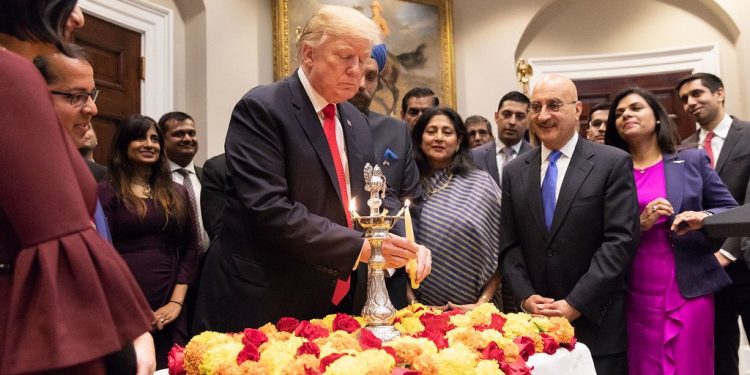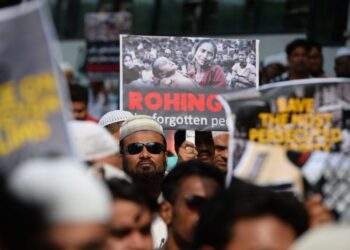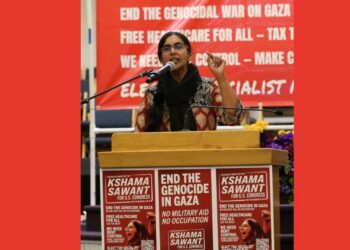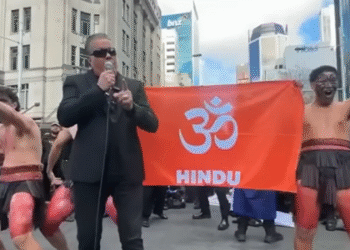Study also found that US-born Indian Americans are more likely to complain of discrimination than those born outside US, mostly in India
Social networks of Indian-Americans are more homogenous in terms of religion than either their state of origin or caste, according to a recently released survey report, which also found that the diaspora is increasingly polarised along partisan lines.
The report, Social Realities of Indian Americans: Results from the 2020 Indian American Attitudes Survey is based on the Indian-American Attitudes Survey (IAAS) – a collaboration between the Carnegie Endowment for International Peace, Johns Hopkins-SAIS, and the University of Pennsylvania.
This study draws on a new source of empirical data to answer these and other questions. Its findings are based on a nationally representative online survey of 1,200 Indian American residents in the United States—the 2020 Indian American Attitudes Survey (IAAS)—conducted between September 1 and September 20, 2020, in partnership with the research and analytics firm YouGov. The survey, drawing on both citizens and non-citizens in the United States, was conducted online using YouGov’s proprietary panel of 1.8 million Americans and has an overall margin of error of +/- 2.8 percent.
Follow NRI Affairs on Facebook, Twitter and Youtube.
This study is the third in a series on the social, political, and foreign policy attitudes of Indian Americans. The major findings are briefly summarized below.
- Indian Americans exhibit very high rates of marriage within their community. While eight out of ten respondents have a spouse or partner of Indian origin, U.S.-born Indian Americans are four times more likely to have a spouse or partner who is of Indian origin but was born in the United States.
- Religion plays a central role in the lives of Indian Americans but religious practice varies. While nearly three-quarters of Indian Americans state that religion plays an important role in their lives, religious practice is less pronounced. Forty percent of respondents pray at least once a day and 27 percent attend religious services at least once a week.
- Roughly half of all Hindu Indian Americans identify with a caste group. Foreign-born respondents are significantly more likely than U.S.-born respondents to espouse a caste identity. The overwhelming majority of Hindus with a caste identity—more than eight in ten—self-identify as belonging to the category of General or upper caste.
- “Indian American” itself is a contested identity. While Indian American is a commonly used shorthand to describe people of Indian origin, it is not universally embraced. Only four in ten respondents believe that “Indian American” is the term that best captures their background.
- Civic and political engagement varies considerably by one’s citizenship status. Across nearly all metrics of civic and political participation, U.S.-born citizens report the highest levels of engagement, followed by foreign-born U.S. citizens, with non-citizens trailing behind.
- Indian Americans’ social communities are heavily populated by other people of Indian origin. Indian Americans—especially members of the first generation—tend to socialize with other Indian Americans. Internally, the social networks of Indian Americans are more homogenous in terms of religion than either Indian region (state) of origin or caste.
- Polarization among Indian Americans reflects broader trends in American society. While religious polarization is less pronounced at an individual level, partisan polarization—linked to political preferences both in India and the United States—is rife. However, this polarization is asymmetric: Democrats are much less comfortable having close friends who are Republicans than the converse. The same is true of Congress Party supporters vis-à-vis supporters of the Bharatiya Janata Party (BJP).
- Indian Americans regularly encounter discrimination. One in two Indian Americans reports being discriminated against in the past one year, with discrimination based on skin color identified as the most common form of bias. Somewhat surprisingly, Indian Americans born in the United States are much more likely to report being victims of discrimination than their foreign-born counterparts.
- To some extent, divisions in India are being reproduced within the Indian American community. While only a minority of respondents are concerned about the importation of political divisions from India to the United States, those who are identify religion, political leadership, and political parties in India as the most common factors.
In other findings, Indian Americans — both born in the US and outside — tend to marry within the community, with US-born Indian Americans marrying non-Indians at a significantly higher number than foreign-born Indian Americans. They tend to hang out with other Indian Americans as their “social network [is] populated with relatively more people of Indian origin. And only 43% believe the phrase “Indian American” describes them adequately. About 30% preferred to be called “Indian” and 6% don’t like the “hyphenated American” part like Bobby Jindal, the Republican who briefly ran for the White House in 2016, and wanted to be called “American”.
The survey makes a broader point that the Indian American community has come of age and as it has come to be portrayed “as a poster child” of America opening up to immigrants, it has also faced greater scrutiny.
“This paper argues that while there is much that binds the community, there are also nascent signs that these common bonds are being tested as religious cleavages, generational divides, and political polarisation invite fragmentation,” the study said in conclusion. “In that sense, the currents coursing their way through the Indian diaspora are perhaps reflective not only of broader developments in American society but also—and perhaps even to a greater extent—the turbulence afflicting India.”
NRI Affairs Correspondent
“The Diwali Ceremonial Lighting of the Diya” by The White House is marked with CC PDM 1.0











